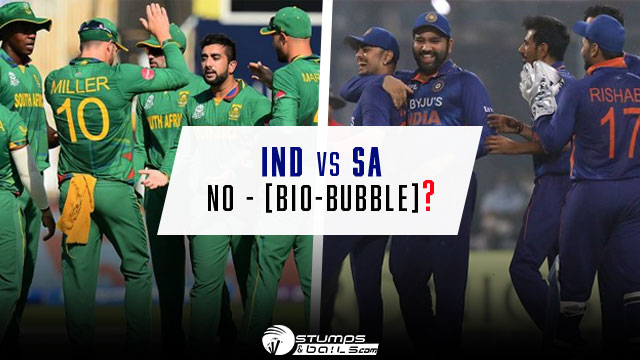For the next 5-match T20I series against South Africa in June, the Indian Board of Control for Cricket is expected to eliminate bio-bubbles. The governing body of Indian cricket will make a final decision on whether or not bio-bubble limitations should be imposed, after assessing the scenario surrounding the Covid-19 series, which runs from June 9 to June 19. In the above article, we have discussed India vs South Africa: Bio-bubbles.
The BCCI revealed the schedule for the 5-match T20I series earlier this week, which will take place after the IPL 2022 concludes. The Arun Jaitley Stadium in New Delhi will be the host of the opening T20I, the five-match series. The remaining games will be held at Cuttack, Visakhapatnam, Rajkot, and Bengaluru.
India vs South Africa: Bio-bubbles expected to be phased out.
“If everything goes as planned and everything stays under control,” a BCCI official told PTI, “there would be no bio-bubbles and rigorous quarantine for the home series against the South African team.” He further continued by saying, “After that, we’re heading to Ireland and England, where there won’t be any bio-bubble either.”
Bio-bubble limits are in place for the IPL 2022 series which will be held in four locations throughout Mumbai and Pune. Concerns about the bio-bubble constraints have grown significantly in the past few years, and the term “bio-bubble weariness” has gained much popularity.
Former India head coach Ravi Shastri has spoken about the difficulties of living in a bio-bubble and has even urged that Virat Kohli, who has been struggling for form in the IPL 2022, take a sabbatical. “Some players have had occasional vacations,” he continued, “but if you look at the wider problem, living in a bio-bubble for one series after another, and now two months of IPL is just tiring for the players.”
There are currently no bio-bubbles for any sports activity in the United Kingdom, therefore the Indian team will enjoy a free atmosphere in the nation where they will play one Test and six white-ball games over the course of three weeks. The players will, however, be tested at regular intervals to guarantee that there are no positive instances inside the group.
All of the players, including skipper Rohit Sharma, senior hitters Virat Kohli and KL Rahul, wicketkeeper Rishabh Pant, pacers Jasprit Bumrah and Mohammed Shami, and spinner Ravindra Jadeja, would be given enough rest before flying to the United Kingdom.
“From June 9 to June 19, five T20 Internationals will be held in five different cities. Obviously, not all of the players will participate in all of the games. Some may be given complete rest, while others may be allowed to play a few games.
“It will only injure these guys if they don’t get systematic breaks.” But, certainly, selectors will decide on the length of the break after speaking with the head coach (Rahul Dravid),” the insider added.


